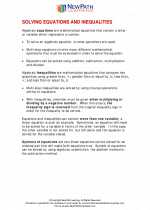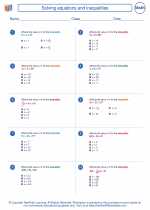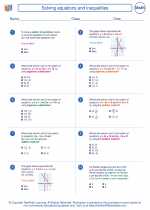Equiangular Hexagon
An equiangular hexagon is a six-sided polygon with all interior angles measuring the same. In other words, all the angles in an equiangular hexagon are congruent.
Properties of an Equiangular Hexagon:
- Interior Angles: All interior angles of an equiangular hexagon are congruent. Each interior angle measures 120° because the sum of all interior angles in a hexagon is 720° (180° * (n - 2), where n is the number of sides).
- Sum of Angles: The sum of the interior angles of an equiangular hexagon is 720°.
- Exterior Angles: The exterior angles of an equiangular hexagon are also congruent and each measures 60°.
- Diagonals: An equiangular hexagon has nine diagonals, which are line segments connecting non-adjacent vertices.
- Sum of Diagonals: The sum of all the diagonals in an equiangular hexagon is 18.
Study Guide:
When studying equiangular hexagons, it's important to understand the following key concepts:
- How to calculate the measure of each interior angle in an equiangular hexagon.
- The relationship between the interior and exterior angles of a hexagon.
- Identifying and calculating the number of diagonals in an equiangular hexagon.
- Understanding the properties and characteristics of an equiangular hexagon.
It's also helpful to practice solving problems involving equiangular hexagons to solidify your understanding of the topic.
Remember to use the formula for finding the sum of interior angles in a polygon (180° * (n - 2)) to verify the total measure of interior angles in a hexagon.
By mastering these concepts and properties, you'll be well-prepared to work with equiangular hexagons and solve related problems.
.◂Math Worksheets and Study Guides Eighth Grade. Solving equations and inequalities
Study Guide Solving equations and inequalities
Solving equations and inequalities  Worksheet/Answer key
Worksheet/Answer key Solving equations and inequalities
Solving equations and inequalities  Worksheet/Answer key
Worksheet/Answer key Solving equations and inequalities
Solving equations and inequalities  Worksheet/Answer key
Worksheet/Answer key Solving equations and inequalities
Solving equations and inequalities 

 Worksheet/Answer key
Worksheet/Answer key
 Worksheet/Answer key
Worksheet/Answer key
 Worksheet/Answer key
Worksheet/Answer key

The resources above cover the following skills:
Algebra (NCTM)
Represent and analyze mathematical situations and structures using algebraic symbols.
Develop an initial conceptual understanding of different uses of variables.